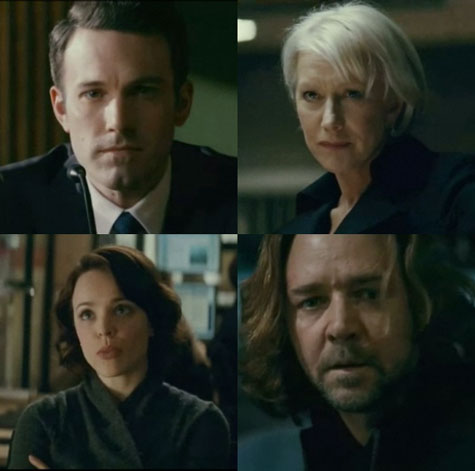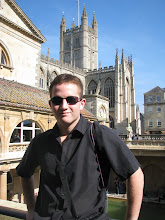
“State of Play” is at once a hyper-relevant exploration of Washington and 21st century power plays while deftly navigating the living, breathing streets of the city of Washington, D.C. from the eyes of a dying breed.
Russell Crowe’s Cal McAffrey is a dinosaur, a relic of printing presses past and he knows it. A staff writer for “The Washington Globe,” an incredibly thinly disguised “Washington Post,” Cal drives a 19 year old car and types on a 16 year old computer. Long hippy bangs and a well fed belly earmark him for future status as a fossil fuel for electric cars of the new age, angle and opinion driven, sensationalist web journalists exemplified by Rachel McAdams’ Della Frye. With the paper under new ownership, the pair are constantly hounded not just about doing the stories but about selling the prints as the film intones journalism as we know it’s death knell, a time where getting the story and getting it right is no longer everything there is, there is also getting it first and getting it last and getting it bought.
Together the still working cliché of the gray shaded vet and wide eyed newbie traverse the halls of power, digging through a tangled web woven between a U.S. Congressman, one Stephen Collins played by a contemplative but oil slick haired Ben Affleck and his dearly departed aide with whom he’d been having an affair. Careful not to use any actual names, the film points a fat finger at government contracting PointCorp, a thinly veiled analogy to Blackwater and Halliburton as the Globe is to the Post. Of course, there always has to be the inside man or men, politicians on the take and under the extramarital sheets.
“State of Play” makes no attempts to hide its role as epitaph to journalism and journalists past and present but without future. Everything about Cal screams gruff and tumble reporting with cigarettes and whiskey and instead of wild, wild women, memories of Woodward and Bernstein to drive him insane. There may be no clandestine meetings in parking garages with Deep Throat, but that didn’t stop director Kevin Macdonald from making The Watergate Hotel a prominent location and one nameless, nonexistent spook of an informant a key plot point.
Of course, the film is as much journalistic advertisement as it is death toll. Little in the way of action occurs despite the high tension and ever looming threat of shady men in dark alleys with bulges in their pockets. Instead, the film is very much a reporter’s movie, with ink to paper and fingers to keyboard as the intrepid reporters gallantly seek out the source, making phone calls and sticking feet in doors to get the interview and the scoop. Fortunately for “State of Play,” the depictions of reporting never feel contrived but instead have a sense of extreme realism. The audience feels a bit like a reporter with pad in hand, rifling through the story piece by precious piece as the many disjointed ends slowly resolve themselves without ever giving the plot away.
Few films manage to involve the city of Washington, D.C. as thoroughly as “State of Play.” More than just a few scant looks at the Capitol and night shots of the Washington Monument, the city comes alive as those familiar see literally dozens of notable landmarks, constantly making mental notes that they were there, becoming ever more a part of the story, not just a viewer but a bystander watching the cars and reporters and rolls of newspaper waft by.
“State of Play” makes its points and it makes them well. A bold and tense exploration of Washington, the city and its politics, it involves the audience in the life and times of reporting, perhaps a little more adventure and a little less droll reporting but still ultimately speaking a level of truth about the power of the pen. Great acting and a thrilling plot make the two hours fly by in a whirl of pen and ink and the power of the press.
A journalist myself, Hollywood once again proves it can remind me why I love something. The film industry still has the strength within itself to make a story exciting and compelling and human without lots of explosions but instead mounds of relevance and reflection.

No comments:
Post a Comment